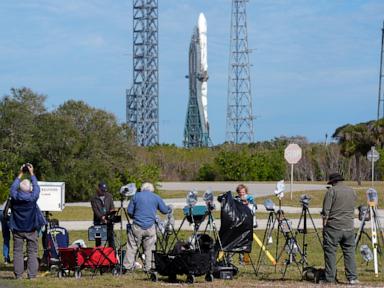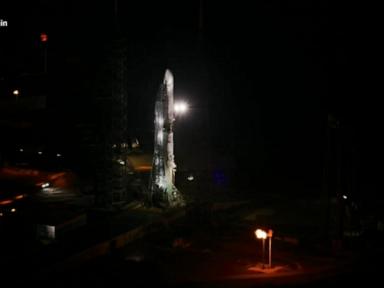Jeff Bezos’ Successful Blue Origin Launch Silences Skeptics
 The successful flight to orbit of the Amazon founder’s powerful rocket suggests it could grow into a credible competitor with Elon Musk’s SpaceX.
The successful flight to orbit of the Amazon founder’s powerful rocket suggests it could grow into a credible competitor with Elon Musk’s SpaceX.
Read more at The New York Times
Topics
-

Jeff Bezos’ Blue Origin launches massive New Glenn rocket on first test flight
Blue Origin has launched its massive new rocket on its first test flightABC News - 4h -
Jeff Bezos' Blue Origin New Glenn rocket soars into space on maiden flight
Despite losing its booster during a landing attempt, the upper stage reached orbit as planned.CBS News - 5h -

Watch: Lift-off for Jeff Bezos' Blue Origin rocket
The mission was partially successful after the booster that propelled the rocket into space failed to land on a platform in the ocean.BBC News - 11h -

Jeff Bezos’s Blue Origin calls off debut rocket launch minutes before blastoff
Controllers scrap launch of 320ft New Glenn rocket due to unspecified issue in final minutes of countdown. Blue Origin called off the debut launch of its new rocket early on Monday because of ...The Guardian - 3d -

WATCH: Jeff Bezos' Blue Origin calls off debut launch of massive new rocket
The reusable New Glenn rocket marks the first major competitor to Elon Musk’s SpaceX Falcon 9, which has been launching payloads for more than a decade.ABC News - 3d -
Bezos' Blue Origin stands down on debut launch of New Glenn rocket
Jeff Bezos' Blue Origin called off the inaugural launch of its key New Glenn rocket following last-minute issues on the vehicle.CNBC - 3d -

Jeff Bezos’ Blue Origin Rocket Launch Could Give SpaceX Some Competition
If New Glenn lifts off on Monday as planned, the Amazon founder’s rocket company will be on track to give Elon Musk’s SpaceX some genuine competition.The New York Times - 4d -

Blue Origin’s New Glenn Rocket Will Be Jeff Bezos’ Challenge to Elon Musk’s SpaceX
The scheduled Sunday launch could mark a new phase in competition in the commercial space market, and pave the way for the deployment of Amazon’s Kuiper satellite network.Inc. - 6d -

Bezos’s Blue Origin schedules, then delays first orbital launch
New Glenn launch is delayed until at least 12 January due to conditions in the Atlantic, where booster is slated to land. Jeff Bezos ’s Blue Origin announced it would launch its first orbital ...The Guardian - Jan. 9
More from The New York Times
-

SpaceX’s 7th Starship Test Launch: What to Know
Elon Musk’s spaceflight company is continuing its work on the vehicle that could one day take people to the moon and eventually Mars.The New York Times - 1h -
Extinct Human Species Lived in a Brutal Desert, Study Finds
A million years ago, a species known as Homo erectus most likely survived in an arid desert with no trees.The New York Times - 4h -
Celtic Women Held Sway in ‘Matrilocal’ Societies
An ancient cemetery reveals a Celtic tribe that lived in England 2,000 years ago and that was organized around maternal lineages, according to a DNA analysis.The New York Times - 1d -

SpaceX Will Launch Two New Moon Landers on One Rocket: What to Know
Robotic vehicles from Firefly Aerospace of Texas and Ispace of Japan parted ways early Wednesday after being launched on the same SpaceX rocket. Both are aiming for the lunar surface.The New York Times - 1d -
Peruvian Mummies’ Ancient Tattoos Come Under Laser Focus
With a tool often used in the study of dinosaur fossils, scientists uncovered new details in ornate tattoos on the skin of members of the Chancay culture of Peru.The New York Times - 2d
More in Science
-

Lee Zeldin, Trump’s E.P.A. Nominee, Is Short on Environmental Experience
Mr. Zeldin, a Trump loyalist, would be charged with dismantling climate rules and perhaps the agency itself. He faced questions from the Senate Thursday.The New York Times - 10m -

The Next Threat to L.A.? Rainfall That Could Cause Landslides
While firefighters begin containing the Los Angeles wildfires, the land left behind is at a higher risk of floods and debris flows.The New York Times - 40m -

SpaceX’s 7th Starship Test Launch: What to Know
Elon Musk’s spaceflight company is continuing its work on the vehicle that could one day take people to the moon and eventually Mars.The New York Times - 1h -
Extinct Human Species Lived in a Brutal Desert, Study Finds
A million years ago, a species known as Homo erectus most likely survived in an arid desert with no trees.The New York Times - 4h -
New Glenn’s journey to space.
The New York Times - 11h